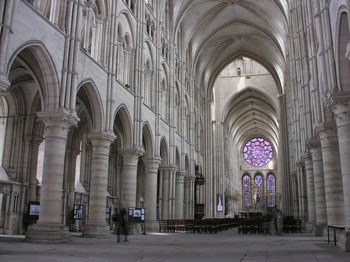ECHO AND REVERBERATION
“This cathedral has an awesome echo!”
I’ve heard this phrase several times and it’s not correct.
There’s a difference between echo and reverberation. Echo is
a single, isolated reflection of sound. Like when we shout on a mountain top and hear
our voice back a few seconds afterwards.
When we are inside a room and a sound is produced, it
sound bounces on the walls, floor and ceiling and gets back to us in the from
of a “soup” of reflections that fade away with time. This is called reverberation.
Or reverb. It’s a sum of echoes, embedded in each other.
Some arrive at our ears first, and they are quite
distinguishable. Those are called early reflections. The time it takes to hear back the first early reflection is called pre-delay.
Every room has a reverb time that is not the same for all
frequencies. It’s longer on low frequencies because they carry more energy and
thus take more time to fade away.
We call reverb time, or RT, or RT60, the time it takes for
the power of a sound to fade until it’s a million times smaller than the
original one (-60dB). Or for the SPL to get a thousand times smaller. The same
thing.
The reverb times will depend on the dimensions and shape of the space, the materials it's built of of and its content. It's one of the greatest concerns of acousticians and the reason for their frequent fights with architects.
A good talking room will have a RT under 1 second, so that
every word will be perfectly perceptible by everyone.
A nice concert hall will have RT’s between 1 and over 2 seconds.
When you listen to a Beethoven concert in open air,
something seems to be missing. In a great concert hall, the reverb will
embelish and link the notes adding magic to the music.
 |
| Boston Symphony Hall |
The same goes to choral music which is usually sung in
churches or cathedrals. The same choir in open air seems to have lost all its charm and musicality.
But we’ll talk about this later…
( to be continued)
ECO E REVERBERAÇÃO
“Esta catedral tem um eco fantástico!”
 |
| A catedral de Chartes, em França |
Já ouvi esta frase várias vezes e não é correcta.
Há uma diferença entre eco e reverberação. Eco é uma reflexão
única, isolada, do som inicial. Como quando gritamos do alto de uma montanha e
ouvimos o retorno da nossa voz poucos
segundos depois.
Quando estamos dentro de uma sala e um som é produzido, ele
bate na paredes, chão e tecto e regressa aos nossos ouvidos sob a forma de uma
“sopa” de reflexões que diminuem com o tempo. A isto chamamos reverberação. Ou
reverb. É uma soma de ecos, embebidos uns nos outros.
Alguns chegam aos nossos ouvidos primeiro e conseguimos
distingui-los. Estes chamam-se early reflections, porque correspondem às primeiras reflexões. O tempo que demora até ouvirmos a primeira reflexão chama-se Pre-Delay.
Toda a sala tem um tempo de reverberação que não é igual
para todas as frequências. É maior nas frequências baixas porque estas carregam
mais energia e demoram mais a dissipar.
Chamamos tempo de reverberação, ou RT, ou até RT60, o tempo
que leva a potência sonora a tornar-se um milhão de vezes mais pequena que a
original (-60dB). Ou para a SPL se tornar mil vezes menor. O que é a mesma
coisa.
Os tempos de reverberação dependem do tamanho da sala, da sua forma, dos seus materiais e dos seus conteúdos e essa gestão é a grande preocupação dos engenheiros acústicos e, muitas vezes a razão das suas lutas com os arquitectos.
Uma boa sala para transmissão da palavra tem menos de 1
segundo de RT, de forma a que cada palavra seja perfeitamente percebida por toda
a gente.
Uma sala de concertos terá entre 1 e mais de 2 segundos de RT.
Quando ouvimos um concerto de Beethoven ao ar livre, parece
que nos falta qualquer coisa. Numa boa sala de concertos, a reverberação vai
embelezar e ligar as notas musicais adicionando magia à música.
 |
| Boston Symphony Hall |
O mesmo se aplica à música coral e de órgão que se ouve habitualmente em
igrejas e catedrais. Um coro ao ar livre parece ter perdido toda a sua musicalidade e encanto.
Mas isso fica para depois…
(continua)


Sem comentários:
Enviar um comentário